Unit 11 How was your school trip?知识讲解
文档属性
| 名称 | Unit 11 How was your school trip?知识讲解 | 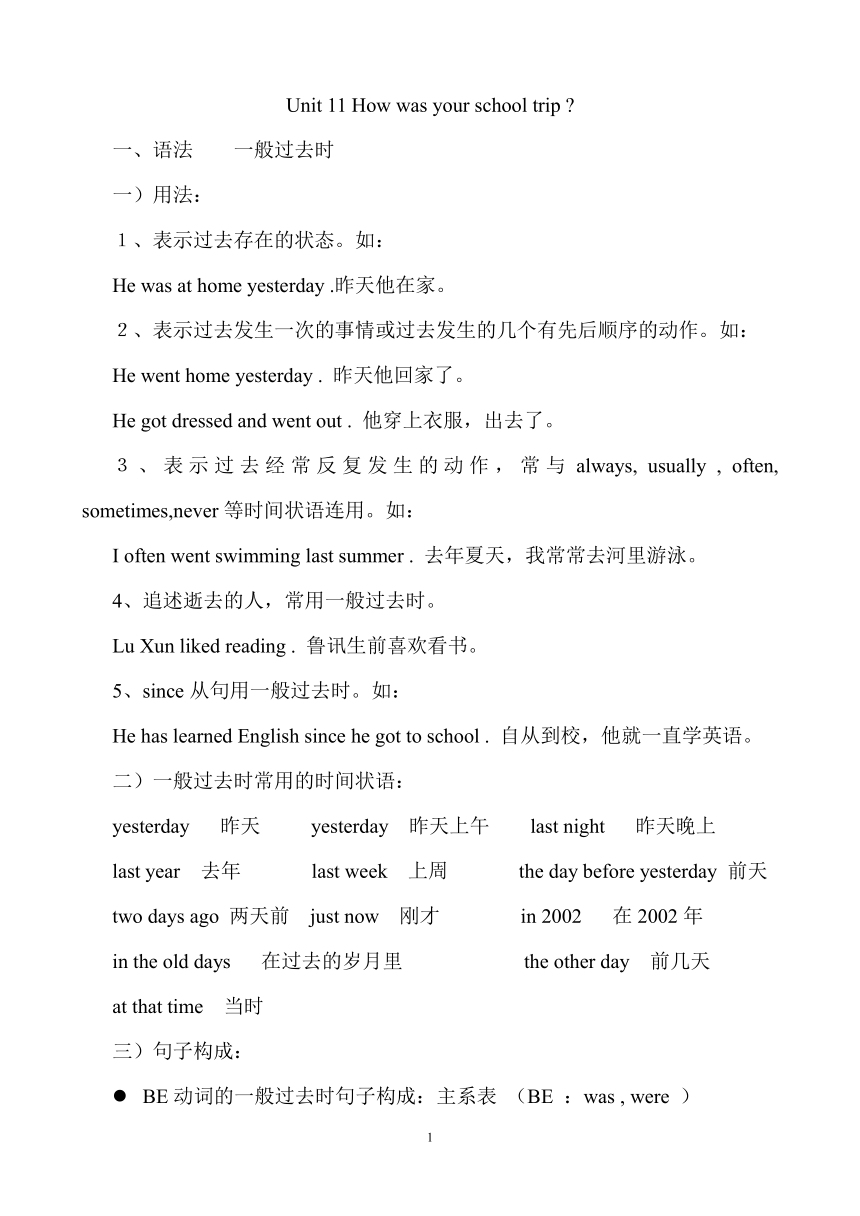 | |
| 格式 | zip | ||
| 文件大小 | 18.8KB | ||
| 资源类型 | 教案 | ||
| 版本资源 | 人教新目标(Go for it)版 | ||
| 科目 | 英语 | ||
| 更新时间 | 2013-12-24 20:53:07 | ||
图片预览

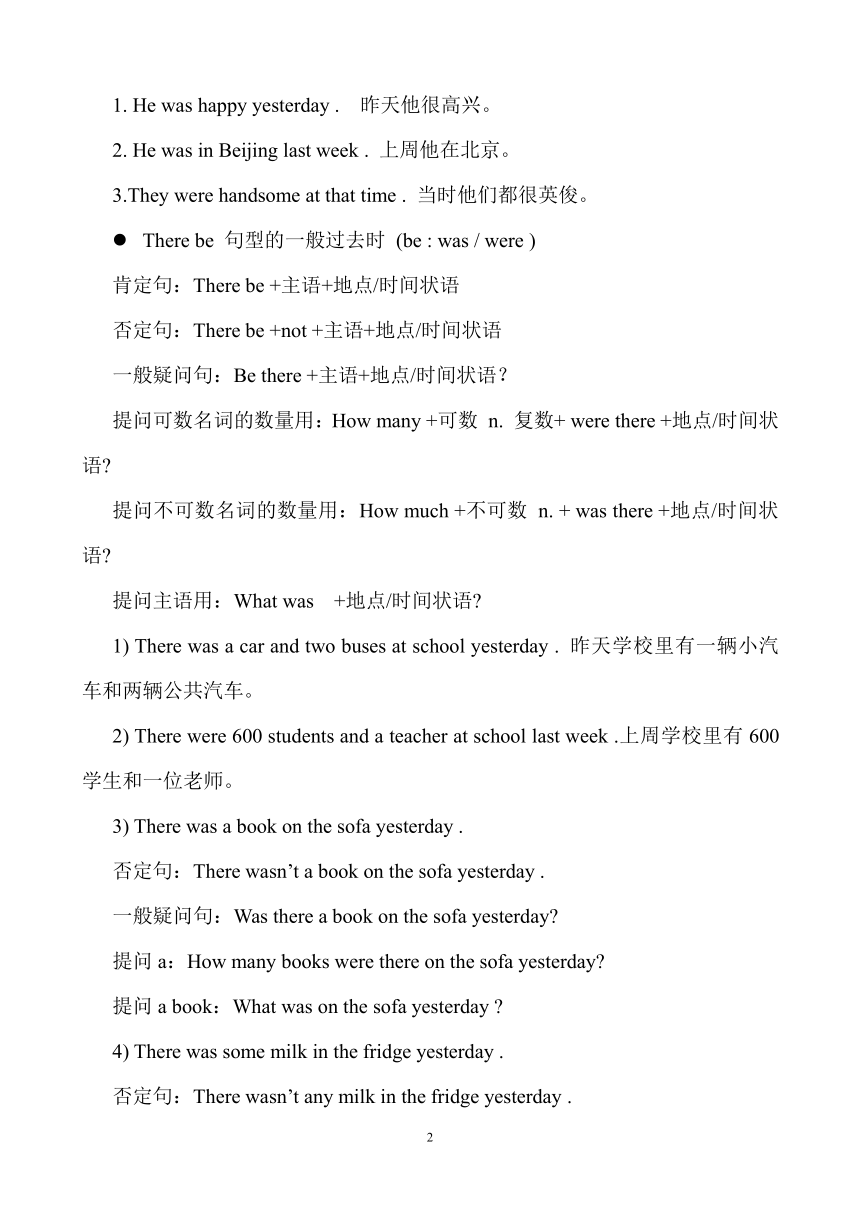
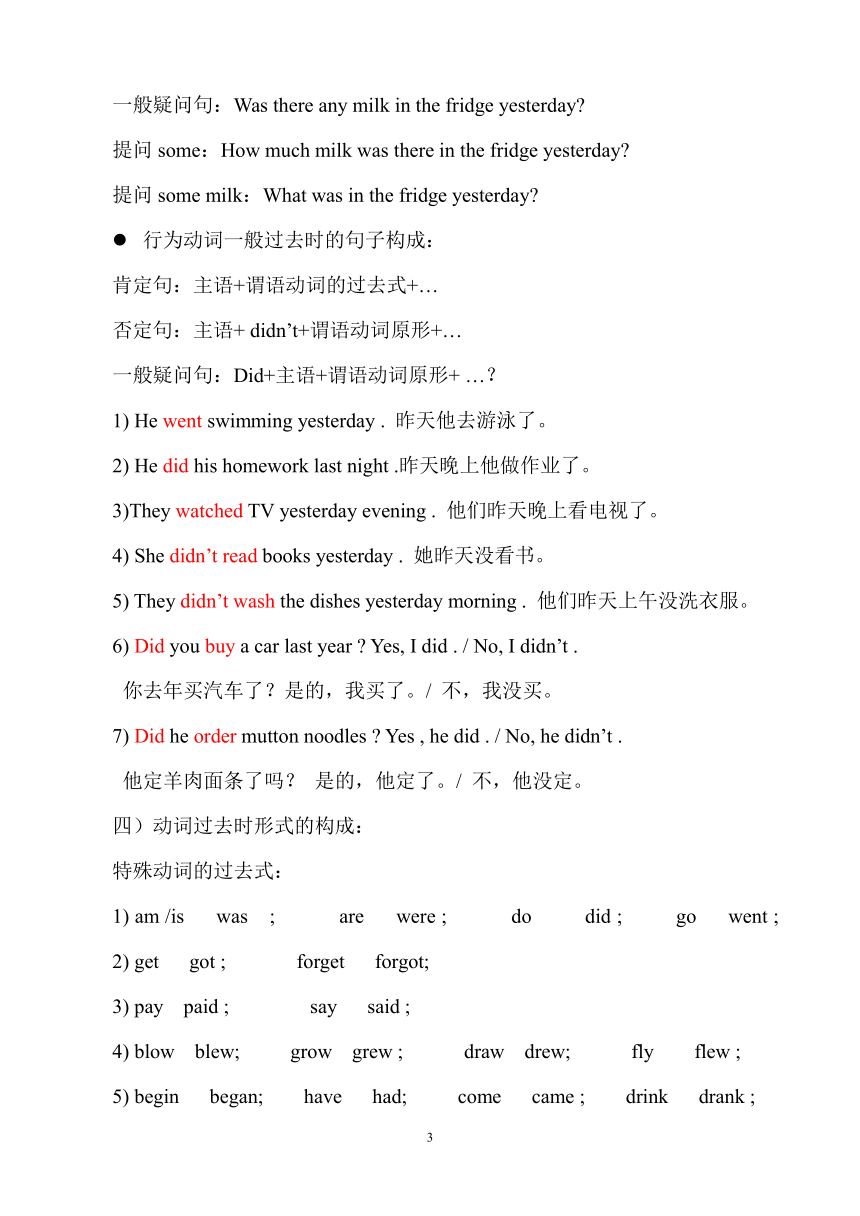
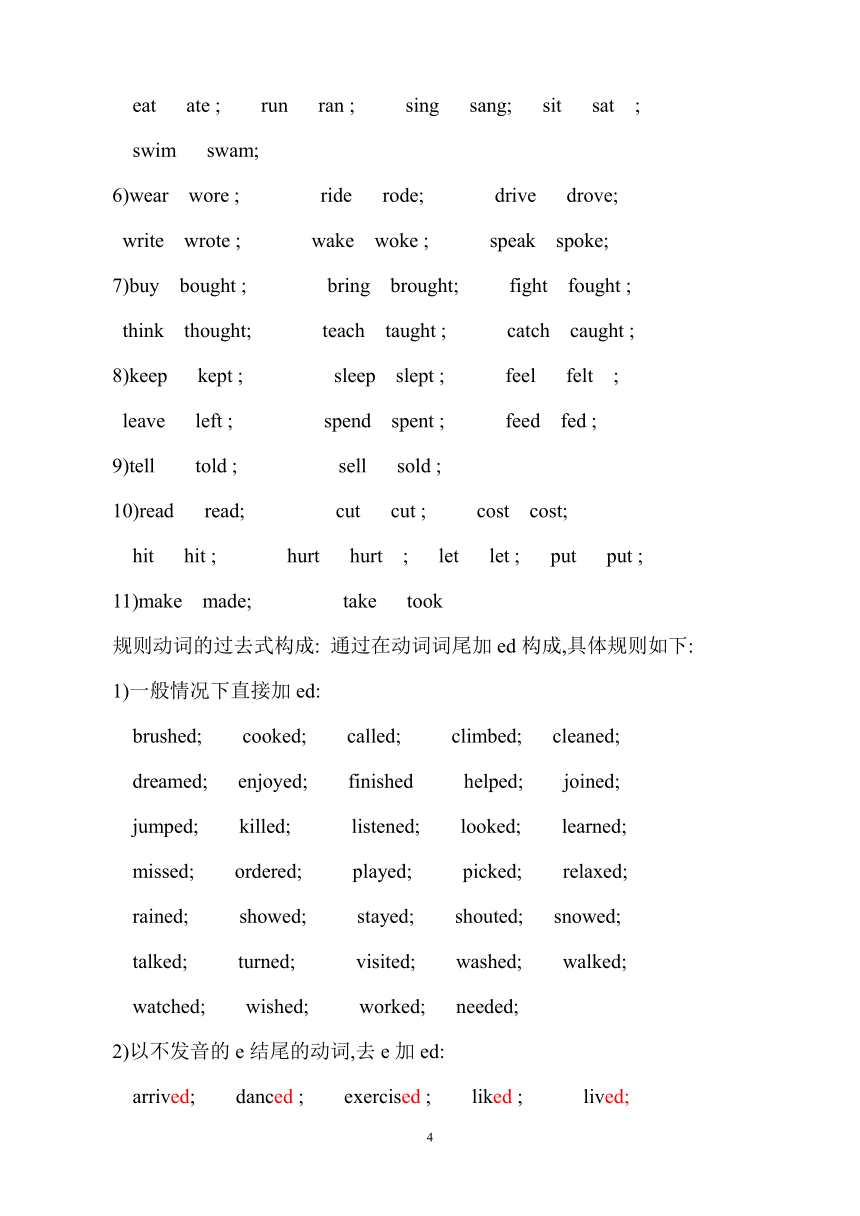
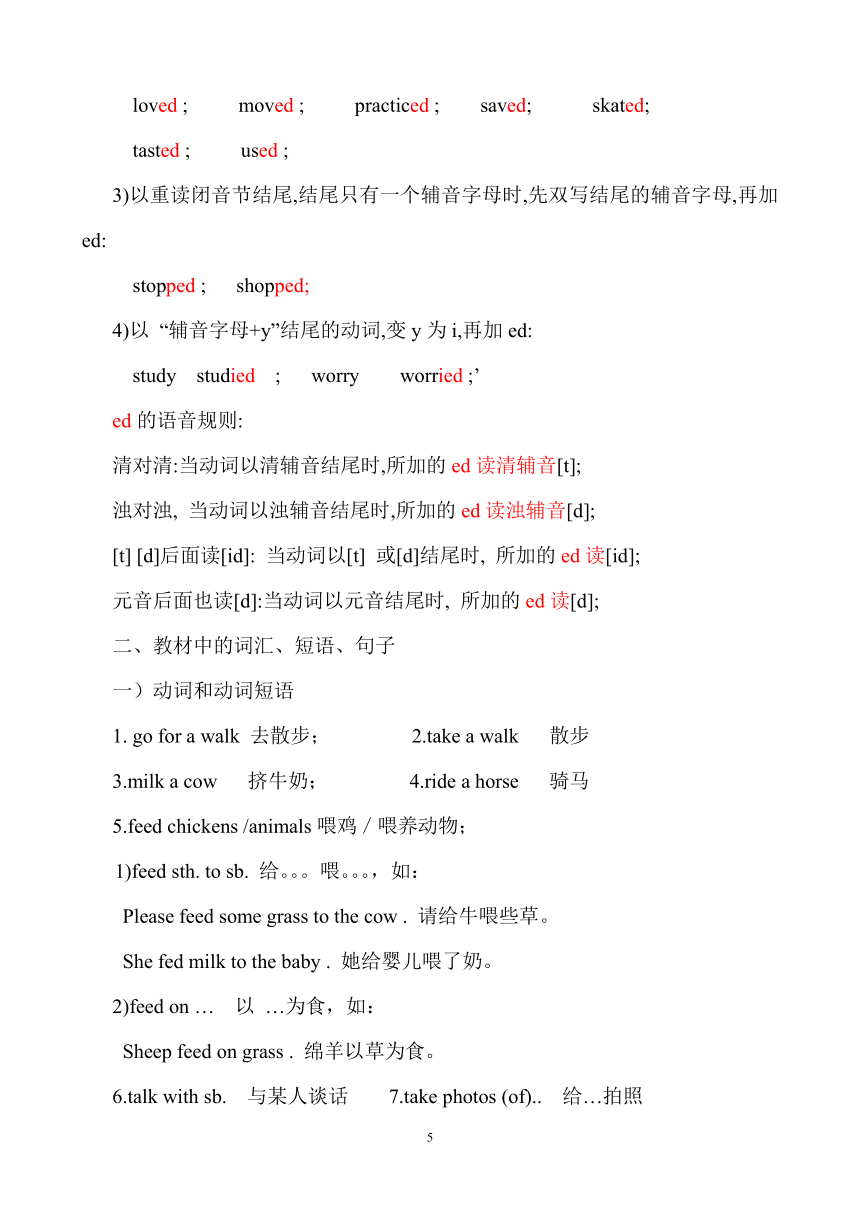
文档简介
Unit 11 How was your school trip
一、语法 一般过去时
一)用法:
1、表示过去存在的状态。如:
He was at home yesterday .昨天他在家。
2、表示过去发生一次的事情或过去发生的几个有先后顺序的动作。如:
He went home yesterday . 昨天他回家了。
He got dressed and went out . 他穿上衣服,出去了。
3、表示过去经常反复发生的动作,常与always, usually , often, sometimes,never等时间状语连用。如:
I often went swimming last summer . 去年夏天,我常常去河里游泳。
4、追述逝去的人,常用一般过去时。
Lu Xun liked reading . 鲁讯生前喜欢看书。
5、since从句用一般过去时。如:
He has learned English since he got to school . 自从到校,他就一直学英语。
二)一般过去时常用的时间状语:
yesterday 昨天 yesterday 昨天上午 last night 昨天晚上
last year 去年 last week 上周 the day before yesterday 前天
two days ago 两天前 just now 刚才 in 2002 在2002年
in the old days 在过去的岁月里 the other day 前几天
at that time 当时
三)句子构成:
BE动词的一般过去时句子构成:主系表 (BE :was , were )
1. He was happy yesterday . 昨天他很高兴。
2. He was in Beijing last week . 上周他在北京。
3.They were handsome at that time . 当时他们都很英俊。
There be 句型的一般过去时 (be : was / were )
肯定句:There be +主语+地点/时间状语
否定句:There be +not +主语+地点/时间状语
一般疑问句:Be there +主语+地点/时间状语?
提问可数名词的数量用:How many +可数 n. 复数+ were there +地点/时间状语
提问不可数名词的数量用:How much +不可数 n. + was there +地点/时间状语
提问主语用:What was +地点/时间状语
1) There was a car and two buses at school yesterday . 昨天学校里有一辆小汽车和两辆公共汽车。
2) There were 600 students and a teacher at school last week .上周学校里有600学生和一位老师。
3) There was a book on the sofa yesterday .
否定句:There wasn’t a book on the sofa yesterday .
一般疑问句:Was there a book on the sofa yesterday
提问a:How many books were there on the sofa yesterday
提问a book:What was on the sofa yesterday
4) There was some milk in the fridge yesterday .
否定句:There wasn’t any milk in the fridge yesterday .
一般疑问句:Was there any milk in the fridge yesterday
提问some:How much milk was there in the fridge yesterday
提问some milk:What was in the fridge yesterday
行为动词一般过去时的句子构成:
肯定句:主语+谓语动词的过去式+…
否定句:主语+ didn’t+谓语动词原形+…
一般疑问句:Did+主语+谓语动词原形+ …?
1) He went swimming yesterday . 昨天他去游泳了。
2) He did his homework last night .昨天晚上他做作业了。
3)They watched TV yesterday evening . 他们昨天晚上看电视了。
4) She didn’t read books yesterday . 她昨天没看书。
5) They didn’t wash the dishes yesterday morning . 他们昨天上午没洗衣服。
6) Did you buy a car last year Yes, I did . / No, I didn’t .
你去年买汽车了?是的,我买了。/ 不,我没买。
7) Did he order mutton noodles Yes , he did . / No, he didn’t .
他定羊肉面条了吗? 是的,他定了。/ 不,他没定。
四)动词过去时形式的构成:
特殊动词的过去式:
1) am /is was ; are were ; do did ; go went ; 2) get got ; forget forgot;
3) pay paid ; say said ;
4) blow blew; grow grew ; draw drew; fly flew ;
5) begin began; have had; come came ; drink drank ;
eat ate ; run ran ; sing sang; sit sat ;
swim swam;
6)wear wore ; ride rode; drive drove;
write wrote ; wake woke ; speak spoke;
7)buy bought ; bring brought; fight fought ;
think thought; teach taught ; catch caught ;
8)keep kept ; sleep slept ; feel felt ;
leave left ; spend spent ; feed fed ;
9)tell told ; sell sold ;
10)read read; cut cut ; cost cost;
hit hit ; hurt hurt ; let let ; put put ;
11)make made; take took
规则动词的过去式构成: 通过在动词词尾加ed构成,具体规则如下:
1)一般情况下直接加ed:
brushed; cooked; called; climbed; cleaned;
dreamed; enjoyed; finished helped; joined;
jumped; killed; listened; looked; learned;
missed; ordered; played; picked; relaxed;
rained; showed; stayed; shouted; snowed;
talked; turned; visited; washed; walked;
watched; wished; worked; needed;
2)以不发音的e结尾的动词,去e加ed:
arrived; danced ; exercised ; liked ; lived;
loved ; moved ; practiced ; saved; skated;
tasted ; used ;
3)以重读闭音节结尾,结尾只有一个辅音字母时,先双写结尾的辅音字母,再加ed:
stopped ; shopped;
4)以 “辅音字母+y”结尾的动词,变y为i,再加ed:
study studied ; worry worried ;’
ed的语音规则:
清对清:当动词以清辅音结尾时,所加的ed读清辅音[t];
浊对浊, 当动词以浊辅音结尾时,所加的ed读浊辅音[d];
[t] [d]后面读[id]: 当动词以[t] 或[d]结尾时, 所加的ed读[id];
元音后面也读[d]:当动词以元音结尾时, 所加的ed读[d];
二、教材中的词汇、短语、句子
一)动词和动词短语
1. go for a walk 去散步; 2.take a walk 散步
3.milk a cow 挤牛奶; 4.ride a horse 骑马
5.feed chickens /animals喂鸡/喂养动物;
1)feed sth. to sb. 给。。。喂。。。,如:
Please feed some grass to the cow . 请给牛喂些草。
She fed milk to the baby . 她给婴儿喂了奶。
2)feed on … 以 …为食,如:
Sheep feed on grass . 绵羊以草为食。
6.talk with sb. 与某人谈话 7.take photos (of).. 给…拍照
8.grow apples/ vegetables/strawberries 种植苹果/蔬菜/草莓
9.show sb. around sp. 带领某人参观某处,如:
Tom showed me around his school . 汤姆带领我参观了他的学校。
10. learn a lot about .. =know a lot about … 知道/了解许多关于…
11. Pick
1) 摘,采,如:
pick strawberries /apples 摘草莓/苹果
Don’t pick flowers in the park . 公园里禁止采花。
We are picking apples now . 我们在摘苹果。
2)Pick up 拾起,(用车)来接/捎带某人/物,如:
He picked up a pen and put it on the desk . 他捡起一只钢笔,放在了课桌上。
I’ll pick you up at your home tomorrow . 我明天去你家接你。
12.watch the stars 看星星 ; 13.go to the zoo 去动物园
14.climb the mountains 爬山
15.worry sb. 使….担心,
The boy always worries his mother . 那个男孩总是让他母亲担心。
Don’t worry your parents . 不要使父母担心。
worry about sb. 担心某人,如:
Don’t worry about him/ her / me. 不要担心他/她/我。
Tell your parents not to worry about you . 告诉父母不要担心你。
e out
1)出来,如:
The sun comes out . 太阳出来了。
2)(花)开放,如:
The flowers begin to come out in spring . 春天花开始开放。
3)出版,发表,如:
His book will come out next week . 他的书下周出版。
17.visit a museum/ a fire station /the zoo参观博物馆/消防站/动物园
18. go fishing 去钓鱼
19. go to the countryside /the mountains 去乡下/大山
20. draw pictures 画图画
21. go on a school trip 参加学校郊游
22. teach
1)teach sb. sth 教某人某事,如:
She teaches us English . 她教我们英语。
2)teach sb. to do sth .教某人做某事,如:
She teaches us to play chess . 她教我们下象棋。
3)teach oneself =learn …by oneself 自学,
4) teach sb. how to do sth . 教某人怎样做某事,如:
She taught me how to wash the dishes yesterday . 昨天,她教我怎样洗餐具。
23.make a model robot 做机器人模型
24. go to a gift shop 去礼品店
25. buy sth .for sb .=buy sb. sth. 给某人买某物,如:
My mother bought a pair of jeans for me yesterday . =My mother bought me a pair of jeans yesterday . 妈妈昨天给我买了一条牛仔裤。
26. have a nice weekend 周末过得愉快
27.be excellent in …. 在…方面极好/非常好,如:
He is excellent in math. 他的数学非常好.
28.clean
1) v. 打扫, 清洗,
2)adj. 干净的 My classroom is very clean .
二)其他词汇、短语
1.Did you learn anything 你学到了什么
1)anything 不定代词, 表示 “某事/物”, 主要用于否定句\疑问句中,作 “任何事/物”讲时,用于肯定句中,如:
He listened ,but he didn’t hear anything . 他听了听,但什么也没听到.
Is there anything interesting in today’s newspaper 今天的报纸上有任何有趣的内容吗
Let’s go shopping . And anything in the supermarket is cheap today. 我们购物吧,超市今天任何东西都便宜.
2)不定代词有哪些:
肯定:某人/物 否定/ 疑问:某人/物 用于肯定形式中,表否定:无人/物 每人/物
表示人的 somebody anybody nobody everybody
someone anyone no one everyone
表示物的 something anything nothing everything
用法一:
somebody/something/anyone用于肯定句和表示请求建议的问句中,如:
Would you like something to drink 来点喝的东西好吗
anybody/anything/anyone用于否定句和疑问句中,当表示 “任何人/物”时,可以用于肯定句中,如:
There isn’t anybody in the classroom. 教室里还没有人.
I need somebody to help . Anybody is OK. 我需要人帮助.任何人都可以.
Nothing/nobody/no one用于肯定结构中,表否定,相当,如:
He listened ,but he didn’t hear anything . 他听了听,但什么也没听到.
Everyone/everybody/everything一般用于肯定句中,也可以用于否定句或疑问句中,如:
Everyone is here. 人到齐了.
Is everyone here 人到齐了吗
Not everyone likes dumplings . 并非人人都喜欢水饺.
用法二:
当不定代词作主语时,谓语用单数; 当不定代词有修饰语时,修饰语放在后面,作后置定语,如:
Everyone is here. 人到齐了.
There isn’t anybody in the classroom. 教室里还没有人
Is there anything interesting in today’s newspaper 今天的报纸上有任何有趣的内容吗
I have something important to tell you . 我有一些重要的事情要告诉你.
2.luck ,lucky ,luckily
1) luck n. 运气
Good luck ! 祝你好运.
Special foods can bring good luck to the birthday person .
2)lucky adj . 幸运的,好运的 You are lucky !/ lucky you !你真好运!
3)luckily adv. 幸运地,通常放在句首,表示 “幸运的是…”,用来修饰整个句子,如:
Luckily , we got there on time . 幸运的是,我们准时到达了.
3.alone the way 沿路/线
We saw some farms and villages along the way . 沿途我们看到了一些农场和村庄.
4.at the museum 在博物馆
5.lovely adj . 可爱的,
You look lovely, Mary. 你看起来很美,玛丽。
He had a lovely voice. 他嗓音甜美。
6. all in all , in all
1) all in all总的来说,常用于句首,如
All in all , we had a good time . 总的来说,我们过得很愉快.
All in all , it was an exciting day . 总的来说,这是令人兴奋的一天.
2) in all 总共,合计, 既可放在句首,也可放在句末,如:
There are 600 students in our school in all . 我校总共有600学生.
7.quite 与very 很,十分
1) quite 与very都可以修饰形容词或副词时, very表示的程度更强一些,如:
He is quite tall , but not very tall . 他比较高,可不是很高.
2) quite 与very都可以修饰名词,但结构不同, quite + a/an+形容词+名词= a +very +形容词+名词,如:
She is quite a lovely girl .= She is a very lovely girl . 她是一个很可爱的女孩.
8. fun 不可数名词,意为 “乐趣,开心 ,有趣的人或事”,其前常用great, much,a lot of 等修饰,来加强语气,如:
He is great fun . 他是个有趣的人.
Skating is great fun . 滑冰是件有趣的事.
have fun玩得开心,相当于have a good time/ enjoy oneself,后面遇到动词时,后面的动词加ing,表示愉快地做某事, 如:
He had much fun in the park . 他在公园里玩得很开心.
He is having fun picking apples. 他在愉快地摘苹果.
三)句子
1.How was your trip last week 上周你的郊游怎么样
How is / was sth. = What is /was sth. like 用来询问某事情况如何的常用句型,常用答语有:It is/ was great . 好极了. It is / was OK.还可以. It isn’t/wasn’t good. 不好. All right . 很好. It is / was not bad . 还不错.等.
2.I think today’s school trip was terrible . 我认为今天的学校效游非常糟糕.
1)本句为I think引导的宾语从句,主句为一般现在时,宾语从句根据具体情况选用所需时态;如:
I think it rained yesterday . 我认为昨天下雨了.
I think he is studying . 我认为他在学习.
2)变否定句时,要否定主句,即否定前移,如:
I don’t think he can swim .我认为他不会游泳.
I don’t think he washed clothes . 我认为他没洗衣服.
3. The rooms were really dark and it was difficult to take photos .
1)dark adj . 黑暗的,昏暗的,反义词为bright明亮的,如:
They'll be back well before dark. 他们会在天黑以前回来。
What time does it get dark in summer ( javascript:;" \o "机器发音 )夏天什么时候天黑?
The night is too dark for us to see. ( javascript:;" \o "机器发音 ) 夜间太暗,我们看不见.
2)It is/ looks difficult (for sb.) to do sth . 对某人来说做某事怎么样,如:
It’s difficult for me to skate .我滑冰很艰难.
It looks difficult for her to swim . 看起来游泳对她很难.
PAGE
12
一、语法 一般过去时
一)用法:
1、表示过去存在的状态。如:
He was at home yesterday .昨天他在家。
2、表示过去发生一次的事情或过去发生的几个有先后顺序的动作。如:
He went home yesterday . 昨天他回家了。
He got dressed and went out . 他穿上衣服,出去了。
3、表示过去经常反复发生的动作,常与always, usually , often, sometimes,never等时间状语连用。如:
I often went swimming last summer . 去年夏天,我常常去河里游泳。
4、追述逝去的人,常用一般过去时。
Lu Xun liked reading . 鲁讯生前喜欢看书。
5、since从句用一般过去时。如:
He has learned English since he got to school . 自从到校,他就一直学英语。
二)一般过去时常用的时间状语:
yesterday 昨天 yesterday 昨天上午 last night 昨天晚上
last year 去年 last week 上周 the day before yesterday 前天
two days ago 两天前 just now 刚才 in 2002 在2002年
in the old days 在过去的岁月里 the other day 前几天
at that time 当时
三)句子构成:
BE动词的一般过去时句子构成:主系表 (BE :was , were )
1. He was happy yesterday . 昨天他很高兴。
2. He was in Beijing last week . 上周他在北京。
3.They were handsome at that time . 当时他们都很英俊。
There be 句型的一般过去时 (be : was / were )
肯定句:There be +主语+地点/时间状语
否定句:There be +not +主语+地点/时间状语
一般疑问句:Be there +主语+地点/时间状语?
提问可数名词的数量用:How many +可数 n. 复数+ were there +地点/时间状语
提问不可数名词的数量用:How much +不可数 n. + was there +地点/时间状语
提问主语用:What was +地点/时间状语
1) There was a car and two buses at school yesterday . 昨天学校里有一辆小汽车和两辆公共汽车。
2) There were 600 students and a teacher at school last week .上周学校里有600学生和一位老师。
3) There was a book on the sofa yesterday .
否定句:There wasn’t a book on the sofa yesterday .
一般疑问句:Was there a book on the sofa yesterday
提问a:How many books were there on the sofa yesterday
提问a book:What was on the sofa yesterday
4) There was some milk in the fridge yesterday .
否定句:There wasn’t any milk in the fridge yesterday .
一般疑问句:Was there any milk in the fridge yesterday
提问some:How much milk was there in the fridge yesterday
提问some milk:What was in the fridge yesterday
行为动词一般过去时的句子构成:
肯定句:主语+谓语动词的过去式+…
否定句:主语+ didn’t+谓语动词原形+…
一般疑问句:Did+主语+谓语动词原形+ …?
1) He went swimming yesterday . 昨天他去游泳了。
2) He did his homework last night .昨天晚上他做作业了。
3)They watched TV yesterday evening . 他们昨天晚上看电视了。
4) She didn’t read books yesterday . 她昨天没看书。
5) They didn’t wash the dishes yesterday morning . 他们昨天上午没洗衣服。
6) Did you buy a car last year Yes, I did . / No, I didn’t .
你去年买汽车了?是的,我买了。/ 不,我没买。
7) Did he order mutton noodles Yes , he did . / No, he didn’t .
他定羊肉面条了吗? 是的,他定了。/ 不,他没定。
四)动词过去时形式的构成:
特殊动词的过去式:
1) am /is was ; are were ; do did ; go went ; 2) get got ; forget forgot;
3) pay paid ; say said ;
4) blow blew; grow grew ; draw drew; fly flew ;
5) begin began; have had; come came ; drink drank ;
eat ate ; run ran ; sing sang; sit sat ;
swim swam;
6)wear wore ; ride rode; drive drove;
write wrote ; wake woke ; speak spoke;
7)buy bought ; bring brought; fight fought ;
think thought; teach taught ; catch caught ;
8)keep kept ; sleep slept ; feel felt ;
leave left ; spend spent ; feed fed ;
9)tell told ; sell sold ;
10)read read; cut cut ; cost cost;
hit hit ; hurt hurt ; let let ; put put ;
11)make made; take took
规则动词的过去式构成: 通过在动词词尾加ed构成,具体规则如下:
1)一般情况下直接加ed:
brushed; cooked; called; climbed; cleaned;
dreamed; enjoyed; finished helped; joined;
jumped; killed; listened; looked; learned;
missed; ordered; played; picked; relaxed;
rained; showed; stayed; shouted; snowed;
talked; turned; visited; washed; walked;
watched; wished; worked; needed;
2)以不发音的e结尾的动词,去e加ed:
arrived; danced ; exercised ; liked ; lived;
loved ; moved ; practiced ; saved; skated;
tasted ; used ;
3)以重读闭音节结尾,结尾只有一个辅音字母时,先双写结尾的辅音字母,再加ed:
stopped ; shopped;
4)以 “辅音字母+y”结尾的动词,变y为i,再加ed:
study studied ; worry worried ;’
ed的语音规则:
清对清:当动词以清辅音结尾时,所加的ed读清辅音[t];
浊对浊, 当动词以浊辅音结尾时,所加的ed读浊辅音[d];
[t] [d]后面读[id]: 当动词以[t] 或[d]结尾时, 所加的ed读[id];
元音后面也读[d]:当动词以元音结尾时, 所加的ed读[d];
二、教材中的词汇、短语、句子
一)动词和动词短语
1. go for a walk 去散步; 2.take a walk 散步
3.milk a cow 挤牛奶; 4.ride a horse 骑马
5.feed chickens /animals喂鸡/喂养动物;
1)feed sth. to sb. 给。。。喂。。。,如:
Please feed some grass to the cow . 请给牛喂些草。
She fed milk to the baby . 她给婴儿喂了奶。
2)feed on … 以 …为食,如:
Sheep feed on grass . 绵羊以草为食。
6.talk with sb. 与某人谈话 7.take photos (of).. 给…拍照
8.grow apples/ vegetables/strawberries 种植苹果/蔬菜/草莓
9.show sb. around sp. 带领某人参观某处,如:
Tom showed me around his school . 汤姆带领我参观了他的学校。
10. learn a lot about .. =know a lot about … 知道/了解许多关于…
11. Pick
1) 摘,采,如:
pick strawberries /apples 摘草莓/苹果
Don’t pick flowers in the park . 公园里禁止采花。
We are picking apples now . 我们在摘苹果。
2)Pick up 拾起,(用车)来接/捎带某人/物,如:
He picked up a pen and put it on the desk . 他捡起一只钢笔,放在了课桌上。
I’ll pick you up at your home tomorrow . 我明天去你家接你。
12.watch the stars 看星星 ; 13.go to the zoo 去动物园
14.climb the mountains 爬山
15.worry sb. 使….担心,
The boy always worries his mother . 那个男孩总是让他母亲担心。
Don’t worry your parents . 不要使父母担心。
worry about sb. 担心某人,如:
Don’t worry about him/ her / me. 不要担心他/她/我。
Tell your parents not to worry about you . 告诉父母不要担心你。
e out
1)出来,如:
The sun comes out . 太阳出来了。
2)(花)开放,如:
The flowers begin to come out in spring . 春天花开始开放。
3)出版,发表,如:
His book will come out next week . 他的书下周出版。
17.visit a museum/ a fire station /the zoo参观博物馆/消防站/动物园
18. go fishing 去钓鱼
19. go to the countryside /the mountains 去乡下/大山
20. draw pictures 画图画
21. go on a school trip 参加学校郊游
22. teach
1)teach sb. sth 教某人某事,如:
She teaches us English . 她教我们英语。
2)teach sb. to do sth .教某人做某事,如:
She teaches us to play chess . 她教我们下象棋。
3)teach oneself =learn …by oneself 自学,
4) teach sb. how to do sth . 教某人怎样做某事,如:
She taught me how to wash the dishes yesterday . 昨天,她教我怎样洗餐具。
23.make a model robot 做机器人模型
24. go to a gift shop 去礼品店
25. buy sth .for sb .=buy sb. sth. 给某人买某物,如:
My mother bought a pair of jeans for me yesterday . =My mother bought me a pair of jeans yesterday . 妈妈昨天给我买了一条牛仔裤。
26. have a nice weekend 周末过得愉快
27.be excellent in …. 在…方面极好/非常好,如:
He is excellent in math. 他的数学非常好.
28.clean
1) v. 打扫, 清洗,
2)adj. 干净的 My classroom is very clean .
二)其他词汇、短语
1.Did you learn anything 你学到了什么
1)anything 不定代词, 表示 “某事/物”, 主要用于否定句\疑问句中,作 “任何事/物”讲时,用于肯定句中,如:
He listened ,but he didn’t hear anything . 他听了听,但什么也没听到.
Is there anything interesting in today’s newspaper 今天的报纸上有任何有趣的内容吗
Let’s go shopping . And anything in the supermarket is cheap today. 我们购物吧,超市今天任何东西都便宜.
2)不定代词有哪些:
肯定:某人/物 否定/ 疑问:某人/物 用于肯定形式中,表否定:无人/物 每人/物
表示人的 somebody anybody nobody everybody
someone anyone no one everyone
表示物的 something anything nothing everything
用法一:
somebody/something/anyone用于肯定句和表示请求建议的问句中,如:
Would you like something to drink 来点喝的东西好吗
anybody/anything/anyone用于否定句和疑问句中,当表示 “任何人/物”时,可以用于肯定句中,如:
There isn’t anybody in the classroom. 教室里还没有人.
I need somebody to help . Anybody is OK. 我需要人帮助.任何人都可以.
Nothing/nobody/no one用于肯定结构中,表否定,相当,如:
He listened ,but he didn’t hear anything . 他听了听,但什么也没听到.
Everyone/everybody/everything一般用于肯定句中,也可以用于否定句或疑问句中,如:
Everyone is here. 人到齐了.
Is everyone here 人到齐了吗
Not everyone likes dumplings . 并非人人都喜欢水饺.
用法二:
当不定代词作主语时,谓语用单数; 当不定代词有修饰语时,修饰语放在后面,作后置定语,如:
Everyone is here. 人到齐了.
There isn’t anybody in the classroom. 教室里还没有人
Is there anything interesting in today’s newspaper 今天的报纸上有任何有趣的内容吗
I have something important to tell you . 我有一些重要的事情要告诉你.
2.luck ,lucky ,luckily
1) luck n. 运气
Good luck ! 祝你好运.
Special foods can bring good luck to the birthday person .
2)lucky adj . 幸运的,好运的 You are lucky !/ lucky you !你真好运!
3)luckily adv. 幸运地,通常放在句首,表示 “幸运的是…”,用来修饰整个句子,如:
Luckily , we got there on time . 幸运的是,我们准时到达了.
3.alone the way 沿路/线
We saw some farms and villages along the way . 沿途我们看到了一些农场和村庄.
4.at the museum 在博物馆
5.lovely adj . 可爱的,
You look lovely, Mary. 你看起来很美,玛丽。
He had a lovely voice. 他嗓音甜美。
6. all in all , in all
1) all in all总的来说,常用于句首,如
All in all , we had a good time . 总的来说,我们过得很愉快.
All in all , it was an exciting day . 总的来说,这是令人兴奋的一天.
2) in all 总共,合计, 既可放在句首,也可放在句末,如:
There are 600 students in our school in all . 我校总共有600学生.
7.quite 与very 很,十分
1) quite 与very都可以修饰形容词或副词时, very表示的程度更强一些,如:
He is quite tall , but not very tall . 他比较高,可不是很高.
2) quite 与very都可以修饰名词,但结构不同, quite + a/an+形容词+名词= a +very +形容词+名词,如:
She is quite a lovely girl .= She is a very lovely girl . 她是一个很可爱的女孩.
8. fun 不可数名词,意为 “乐趣,开心 ,有趣的人或事”,其前常用great, much,a lot of 等修饰,来加强语气,如:
He is great fun . 他是个有趣的人.
Skating is great fun . 滑冰是件有趣的事.
have fun玩得开心,相当于have a good time/ enjoy oneself,后面遇到动词时,后面的动词加ing,表示愉快地做某事, 如:
He had much fun in the park . 他在公园里玩得很开心.
He is having fun picking apples. 他在愉快地摘苹果.
三)句子
1.How was your trip last week 上周你的郊游怎么样
How is / was sth. = What is /was sth. like 用来询问某事情况如何的常用句型,常用答语有:It is/ was great . 好极了. It is / was OK.还可以. It isn’t/wasn’t good. 不好. All right . 很好. It is / was not bad . 还不错.等.
2.I think today’s school trip was terrible . 我认为今天的学校效游非常糟糕.
1)本句为I think引导的宾语从句,主句为一般现在时,宾语从句根据具体情况选用所需时态;如:
I think it rained yesterday . 我认为昨天下雨了.
I think he is studying . 我认为他在学习.
2)变否定句时,要否定主句,即否定前移,如:
I don’t think he can swim .我认为他不会游泳.
I don’t think he washed clothes . 我认为他没洗衣服.
3. The rooms were really dark and it was difficult to take photos .
1)dark adj . 黑暗的,昏暗的,反义词为bright明亮的,如:
They'll be back well before dark. 他们会在天黑以前回来。
What time does it get dark in summer ( javascript:;" \o "机器发音 )夏天什么时候天黑?
The night is too dark for us to see. ( javascript:;" \o "机器发音 ) 夜间太暗,我们看不见.
2)It is/ looks difficult (for sb.) to do sth . 对某人来说做某事怎么样,如:
It’s difficult for me to skate .我滑冰很艰难.
It looks difficult for her to swim . 看起来游泳对她很难.
PAGE
12
同课章节目录
- Unit 1 Can you play the guitar?
- Section A
- Section B
- Unit 2 What time do you go to school?
- Section A
- Section B
- Unit 3 How do you get to school?
- Section A
- Section B
- Unit 4 Don't eat in class.
- Section A
- Section B
- Unit 5 Why do you like pandas?
- Section A
- Section B
- Unit 6 I'm watching TV.
- Section A
- Section B
- Review of Units 1-6
- Unit 7 It's raining!
- Section A
- Section B
- Unit 8 Is there a post office near here?
- Section A
- Section B
- Unit 9 What does he look like?
- Section A
- Section B
- Unit 10 I'd like some noodles.
- Section A
- Section B
- Unit 11 How was your school trip?
- Section A
- Section B
- Unit 12 What did you do last weekend?
- Section A
- Section B
